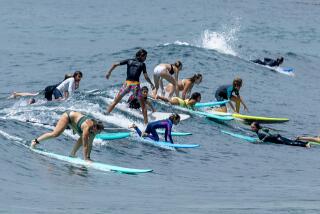Tips for Safe Boating
- Share via
Operator inexperience, incompetence, negligence and intoxication are contributing factors in reported accidents in which boats or propellers strike people, as well as in all other types of boating accidents, according to the U.S. Coast Guard.
Passengers moving about a boat, or who are improperly seated on the bow, may be thrown from the boat or fall overboard when boat operators jump wakes, make sharp turns or perform other maneuvers at speeds which are too fast for prevailing conditions.
Negligent operation of a vessel that endangers lives or property is illegal. The Coast Guard may impose a civil penalty for negligent operation. Grossly negligent operation involves situations in which the boat operator knows a certain act can create an unreasonable risk of harm. Some actions that may constitute negligent or grossly negligent boat operation include:
* Operating a boat in a swimming area.
* Operating a boat while under the influence of alcohol or drugs.
* Using excessive speed in the vicinity of boats or in dangerous waters.
* Water-skiing in a hazardous manner.
* Riding on the bow, seat back, gunwale or transom.
Most boat or propeller-impact accidents can be prevented by boat operators who follow basic safe-boating practices:
* Always maintain a lookout. The greatest single cause of accidents in which people in the water are struck by a boat or its propeller is operator inattention or carelessness.
* Make sure the engine is off so the propeller is not rotating when passengers are boarding or disembarking a boat.
* Never start a boat with the engine in gear.
* Slow down when approaching congested areas and anchorages.
* In congested areas, always be alert for swimmers and divers.
* Become familiar with the warning buoys signifying swimming areas and other hazardous areas.
* Keep the boat clear of marked swimming and diving areas.
* Become familiar with the red-and-white or blue-and-white diagonally striped flags signaling that divers are down.
* Before getting underway, make sure passengers are properly seated.
Source: U.S. Coast Guard
More to Read
Sign up for The Wild
We’ll help you find the best places to hike, bike and run, as well as the perfect silent spots for meditation and yoga.
You may occasionally receive promotional content from the Los Angeles Times.






